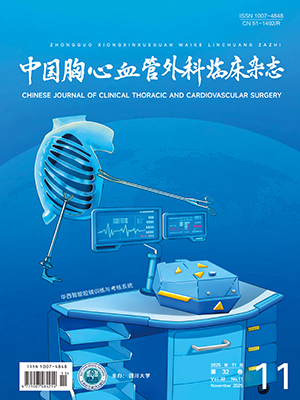| 1. |
Denham JW, Burmeister BH, Lamb DS, et al. Factors influencing outcome following radio-chemotherapy for oesophageal cancer. The Trans Tasman Radiation Oncology Group (TROG). Radiother Oncol, 1996, 40(1): 31-43.
|
| 2. |
Edge SB, Compton CC. The American Joint Committee on Cancer: The 7th edition of the AJCC cancer staging manual and the future of TNM. Ann Surg Oncol, 2010, 17(6): 1471-1474.
|
| 3. |
Rice TW. Esophageal cancer staging. Korean J Thorac Cardiovasc Surg, 2015, 48(3): 157-163.
|
| 4. |
Nakahara R, Kodaira T, Furutani K, et al. Treatment outcomes of definitive chemoradiotherapy for patients with hypopharyngeal cancer. J Radiat Res, 2012, 53(6): 906-915.
|
| 5. |
Cooper JS, Guo MD, Herskovic A, et al. Chemoradiotherapy of locally advanced esophageal cancer: Long-term follow-up of a prospective randomized trial (RTOG 85-01). Radiation Therapy Oncology Group. JAMA, 1999, 281(17): 1623-1627.
|
| 6. |
Buckstein M, Liu J. Cervical esophageal cancers: Challenges and opportunities. Curr Oncol Rep, 2019, 21(5): 46.
|
| 7. |
Wang WP, Ma J, Lu Q, et al. Larynx-preserving limited resection with total thoracic esophagectomy and gastric pull-up reconstruction: A promising treatment for selected cervical esophageal squamous cell carcinoma. Turk J Gastroenterol, 2020, 31(12): 948-954.
|
| 8. |
Saeki H, Sohda M, Sakai M, et al. Role of surgery in multidisciplinary treatment strategies for locally advanced esophageal squamous cell carcinoma. Ann Gastroenterol Surg, 2020, 4(5): 490-497.
|
| 9. |
国家卫生健康委员会. 食管癌诊疗规范(2018年版). 《中华消化病与影像杂志(电子版)》, 2019, 9 (4): 158-192.
|
| 10. |
Smalley SR, Benedetti JK, Haller DG, et al. Updated analysis of SWOG-directed intergroup study 0116: A phase Ⅲ trial of adjuvant radiochemotherapy versus observation after curative gastric cancer resection. J Clin Oncol, 2012, 30(19): 2327-2333.
|
| 11. |
Noh SH, Park SR, Yang HK, et al. Adjuvant capecitabine plus oxaliplatin for gastric cancer after D2 gastrectomy (CLASSIC): 5-year follow-up of an open-label, randomised phase 3 trial. Lancet Oncol, 2014, 15(12): 1389-1396.
|
| 12. |
赫捷. 食管癌规范化诊治指南(第2版). 中国协和医科大学出版社, 2013.
|
| 13. |
Zhao L, Zhou Y, Mu Y, et al. Patterns of failure and clinical outcomes of definitive radiotherapy for cervical esophageal cancer. Oncotarget, 2017, 8(13): 21852-21860.
|
| 14. |
Chou SH, Li HP, Lee JY, et al. Radical resection or chemoradiotherapy for cervical esophageal cancer? World J Surg, 2010, 34(8): 1832-1839.
|
| 15. |
Kikuchi H, Takeuchi H. Future perspectives of surgery for esophageal cancer. Ann Thorac Cardiovasc Surg, 2018, 24(5): 219-222.
|
| 16. |
Cao CN, Luo JW, Gao L, et al. Primary radiotherapy compared with primary surgery in cervical esophageal cancer. JAMA Otolaryngol Head Neck Surg, 2014, 140(10): 918-926.
|
| 17. |
Pöttgen C, Stuschke M. Radiotherapy versus surgery within multimodality protocols for esophageal cancer — A meta-analysis of the randomized trials. Cancer Treat Rev, 2012, 38(6): 599-604.
|
| 18. |
Grass GD, Cooper SL, Armeson K, et al. Cervical esophageal cancer: A population-based study. Head Neck, 2015, 37(6): 808-814.
|
| 19. |
王武平, 马洁, 张继朋, 等. 颈段食管鳞癌与胸上段食管鳞癌外科治疗比较的倾向性评分匹配分析. 中国胸心血管外科临床杂志, 2021, 28(6): 706-713.
|
| 20. |
Zhang J, Zhang W, Zhang B, et al. Clinical results of intensity-modulated radiotherapy for 250 patients with cervical and upper thoracic esophageal carcinoma. Cancer Manag Res, 2019, 11: 8285-8294.
|
| 21. |
Saeki H, Tsutsumi S, Yukaya T, et al. Clinicopathological features of cervical esophageal cancer: Retrospective analysis of 63 consecutive patients who underwent surgical resection. Ann Surg, 2017, 265(1): 130-136.
|
| 22. |
Ando N, Iizuka T, Ide H, et al. Surgery plus chemotherapy compared with surgery alone for localized squamous cell carcinoma of the thoracic esophagus: A Japan Clinical Oncology Group Study—JCOG9204. J Clin Oncol, 2003, 21(24): 4592-4596.
|
| 23. |
Nomura M, Oze I, Abe T, et al. Impact of docetaxel in addition to cisplatin and fluorouracil as neoadjuvant treatment for resectable stage Ⅲ or T3 esophageal cancer: A propensity score-matched analysis. Cancer Chemother Pharmacol, 2015, 76(2): 357-363.
|
| 24. |
Wang T, Yu J, Liu M, et al. The benefit of taxane-based therapies over fluoropyrimidine plus platinum (FP) in the treatment of esophageal cancer: A meta-analysis of clinical studies. Drug Des Devel Ther, 2019, 13: 539-553.
|




